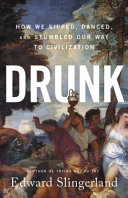2018 School Spending Survey Report
Drunk: How We Sipped, Danced, and Stumbled Our Way to Civilization
COPY ISBN
 Why do people all over the world use intoxicants that impair thinking and cause long-term health problems? Slingerland (Asian studies, Univ. of British Columbia; Trying Not To Try) attempts to answer this question. His book is international in scope and covers a wide range of topics around this peculiar human behavior and its potential evolutionary or social explanations. He analyzes some widespread theories of drug and alcohol use: “hijack theory” asserts that humans are smart enough to exploit evolution’s pleasure systems, while “hangover theory” suggests that we tend to overindulge in substances that, in smaller amounts, would have evolutionary advantages. He also discusses simple functional uses of alcohol, including its ability to kill bacteria in water; for Slingerland, that functional explanation doesn’t explain why humans haven’t replaced alcohol with, for instance, boiled tea. He proposes that intoxication cools the grip of the prefrontal cortex, allowing a curious and creative childlike mind to wander. There is serious anthropology here, including the tantalizing theory that beer, not bread, was the stimulus for the agricultural revolution. Slingerland’s informal, conversational style weaves modern scientific studies with ancient mythology.
Why do people all over the world use intoxicants that impair thinking and cause long-term health problems? Slingerland (Asian studies, Univ. of British Columbia; Trying Not To Try) attempts to answer this question. His book is international in scope and covers a wide range of topics around this peculiar human behavior and its potential evolutionary or social explanations. He analyzes some widespread theories of drug and alcohol use: “hijack theory” asserts that humans are smart enough to exploit evolution’s pleasure systems, while “hangover theory” suggests that we tend to overindulge in substances that, in smaller amounts, would have evolutionary advantages. He also discusses simple functional uses of alcohol, including its ability to kill bacteria in water; for Slingerland, that functional explanation doesn’t explain why humans haven’t replaced alcohol with, for instance, boiled tea. He proposes that intoxication cools the grip of the prefrontal cortex, allowing a curious and creative childlike mind to wander. There is serious anthropology here, including the tantalizing theory that beer, not bread, was the stimulus for the agricultural revolution. Slingerland’s informal, conversational style weaves modern scientific studies with ancient mythology.
VERDICT An illuminating yet conversational study that takes an anthropological approach to a widespread and often puzzling human behavior.
RELATED
ALREADY A SUBSCRIBER? LOG IN
We are currently offering this content for free. Sign up now to activate your personal profile, where you can save articles for future viewing




Comment Policy:
Comment should not be empty !!!